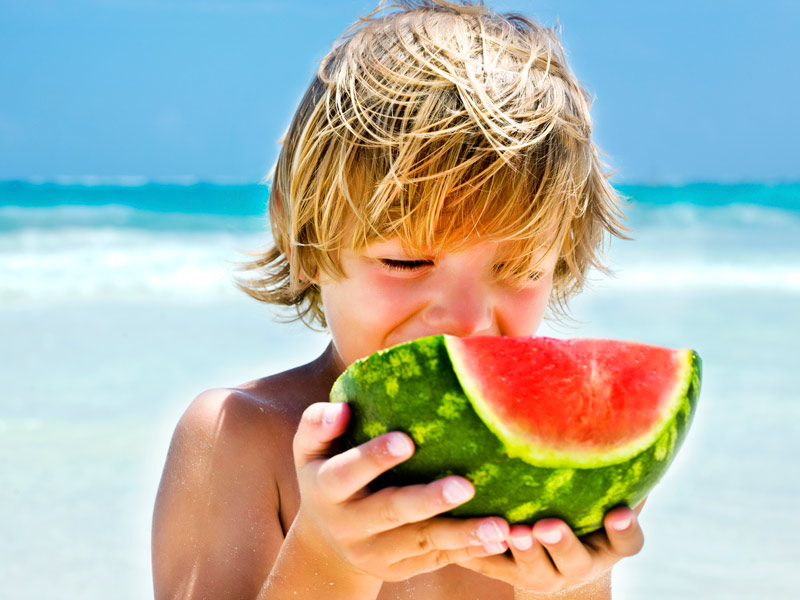Edible Sunscreen—Foods That Protect Your Skin From The Harmful Rays of The Sun
By Mary Kay Kleist
July 2014 View more Health & Fitness
 While you’re soaking up the sun this summer, why not toss a few foods into your grocery cart that could help protect your skin against the harmful rays of the sun? Think colorful, natural foods. Think antioxidants. Some studies suggest that eating a healthy diet packed with these types of powerful foods can help reduce damage from too much sun exposure.
While you’re soaking up the sun this summer, why not toss a few foods into your grocery cart that could help protect your skin against the harmful rays of the sun? Think colorful, natural foods. Think antioxidants. Some studies suggest that eating a healthy diet packed with these types of powerful foods can help reduce damage from too much sun exposure.
DARK CHOCOLATE
Dark chocolate is loaded with antioxidants. It contains flavonoids, which can improve skin texture and also offer resistance to UV rays. The higher percentage of cacao (at least 65 percent), the higher amount of antioxidants you’re receiving. Go ahead and nibble on 1½ ounces a day for the best protection.
WATERMELON
Not only is watermelon sweet, it’s also rich in lycopene, a carotenoid that has been known to protect skin from UV damage. Watermelons have 40 percent more lycopene than tomatoes, which are still a great choice, since they are loaded with lycopene. That’s what gives tomatoes and watermelon their bright color. Lycopene helps neutralize free radicals that can age you before your time.
GREEN TEA
Polyphenols found in green tea can reduce inflammation and act as enzyme inhibitors. Hot is best, as the antioxidant power decreases as the tea cools. Not only can green tea help you keep more of your skin’s elasticity, it also improves hydration. A study in The Journal of Nutrition found that green tea polyphenols can help protect against UV induced skin damage. Drinking two to six cups a day provides your body with the best results.
SWEET POTATOES
Loaded with Vitamin A, sweet potatoes are also carotenoids, offering protection against skin and eye damage from the sun. They’re also high in Vitamin C, which is helpful for collagen production.
OMEGA 3’s
Walnuts, flaxseed, salmon and sardines offer the best sources of Omega 3’s, which are essential fatty acids that reduce inflammation. When your skin is exposed to the dangerous rays of the sun, free radicals are generated. These can damage cells and lead to cancer and premature aging. Omega 3’s can help protect your body against these harmful substances.
RESEARCH RESULTS
Researches say there still needs to be additional studies on the effectiveness of so-called edible sunscreen. “Although there are small studies in humans and animal models that show some evidence that regular consumption of these foods may theoretically reduce sun damage (primarily in theory by reducing free radicals) there is certainly no scientific evidence as of yet that this will have a great impact on decreasing skin cancers in humans to any significant degree,” said Dr. Anthony M. Janiga of Advanced Clinical and Surgical Dermatology in Naperville. “However, the foods are delicious and they don’t appear to increase cellular damage. Therefore, go right ahead and pass me a piece of the dark chocolate please!”
SUNSCREEN 101
However, diet alone won’t protect you from harmful UV rays. Sunscreen is a must. “Approximately 80 percent of the changes we see on our skin and attribute to aging, such as fine lines, wrinkles, age spots, and unwanted small blood vessels are really attributable to Ultraviolet Radiation, not necessarily the aging process itself,” said Janiga. “If sunscreens are used regularly and properly, they can be the ultimate preventative measure to slow down this aging process since the currently recommended SPF of 30 blocks at least 95 percent of these damaging sun rays.” Dr. Janiga also says sunscreens help prevent two of the most common forms of skin cancer, Basal Cell Carcinoma and Squamous Cell Carcinoma. “Prudent sun exposure, wearing protective hats and clothing, and taking advantage of shaded areas need to be part of our ‘Safe Sun’ techniques,” said Dr. Janiga.


